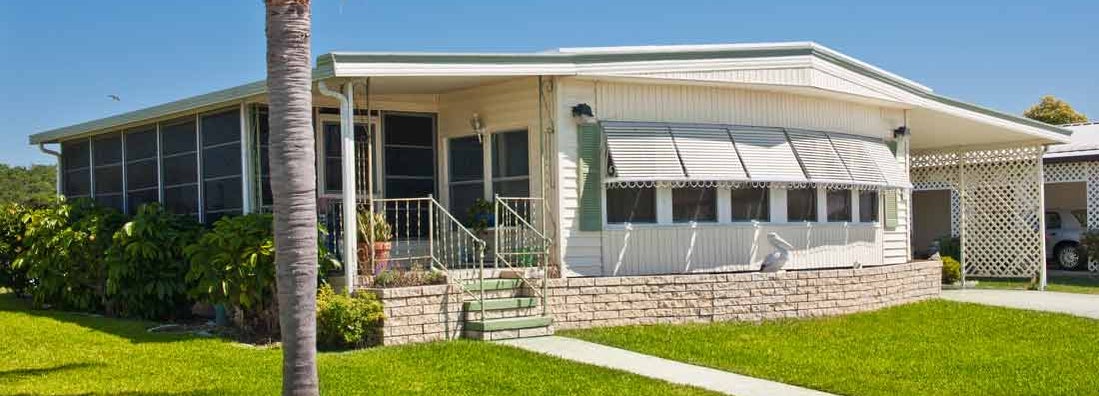HO7 Mobile Home Insurance
(Coverage that puts your mobile home on solid ground)

Christina is a freelance writer and licensed insurance agent. She has worked in many facets of the insurance industry, from entry-level assistant to account manager/sales rep to vice president of operations.

Around 20 million Americans live in mobile or manufactured homes, according to a recent NPR report. Some Americans own their mobile homes while others simply rent their properties. No matter the situation, it’s important for mobile and manufactured homeowners to be insured, the same as for a single family house or a condominium. Enter the HO7 mobile/manufactured home insurance policy which safeguards these types of residences.
HO7 Home Insurance in a Nutshell
First things first, an HO7 policy covers mobile and manufactured homes like:
- Single-wide mobile homes
- Double-wide mobile homes
- Modular Homes
- Sectional homes
- RVs
- Trailers
HO7 mobile home insurance is the same broad form as the popular HO3 for single-family homes. They are called “broad form” because the coverage is meant for all types of risks (or perils) unless it’s a hazard clearly excluded by the policy documents.
Let’s be clear, an HO7 is open to covering almost every risk possible when it comes to the home’s structure and other buildings like sheds or garages. On the other hand, personal belongings inside the mobile home are only protected from risks listed in your policy documents. If your personal items, like furniture or clothes, are ruined by a named hazard, then the insurance carrier will pay you the actual cash value. You’ll basically get reimbursed for the personal items minus depreciation (wear and tear).
HO7 Mobile Home Insurance Coverage Checklist
Check the HO7 coverage checklist below to better understand what your mobile/manufactured home coverage will do for you when you need it most:
Coverage A or dwelling: Covers your mobile or manufactured home’s physical form and any detached structures like sheds or fences. On an HO7 home policy, the insurance company will pay Coverage A claims as replacement cost. This means your claim payout will be the current market value of your ruined home or outbuildings.
Coverage C or personal property: Covers belongings inside your mobile home that are harmed by a hazard listed in your policy. As we mentioned before, the insurer will reimburse you according to the actual cash value of the items.
Each insurance company can have little tweaks or differences to their HO7 mobile home insurance. The most common named perils (risks) are below:
- Fire and lightning
- Windstorms and hail
- Aircraft
- Explosions
- Smoke
- Riots and civil disturbances
- Vehicles
- Theft
- Malicious mischief and vandalism
- Falling object
- Volcanic eruptions
- Damage from the weight of sleet, snow, and ice
- Water damage from plumbing, heating, or air conditioning overflow
- Water heater burning, tearing, and cracking
- Damage from an electrical current
- Pipes freezing
If you happen to own some fancy valuables or important heirlooms, it’s worth talking with your independent insurance agent about buying extra home coverage to protect those special treasures. Your HO7 will take care of your belongings but the maximum benefit may not be enough to replace what’s lost. So many mobile and manufactured home owners purchase extra coverage for stuff like firearms, silverware, engagement rings, and collectibles.
Coverage D or loss of use: Covers expenses for staying at a hotel or relocating while your mobile home is being fixed. Of course, this only applies if your home is unlivable because of a covered risk. For instance, Coverage D isn’t meant for insureds that are just having the space painted and need to avoid the paint fumes for a few days.
Coverage E or personal liability: Covers you in case you’re found guilty of causing someone else’s physical injuries or damage to someone’s property. Coverage E normally has a maximum coverage limit like car insurance does. You can talk with your independent insurance agent about the best Coverage E limit to pick, and higher is usually better.
Coverage F or medical payments: Covers expenses related to someone getting hurt in your mobile home up to the maximum limit. Below are the types of bills your HO7 coverage will pay towards:
- Ambulance and other hospital fees
- Surgery charges
- Medical bills
- X-rays
- Dental care
- Nursing care
- Prosthetic devices
- Funeral expenses
HO7 Insurance: The Not-Covered Checklist
Remember, your HO7 mobile/manufactured home insurance is open to covering pretty much all risks when it comes to the physical building and outbuildings.
Yet the same home policy is only going to cover your personal possessions if they’re ruined by one of the following hazards:
- Hurricane
- Flood
- Earthquakes
- Mold
- Wear and tear
- Vandalism to vacant dwellings
- Neglect
- Intentional acts by the owner
- Damage caused by pets
- Enforcement of building codes or similar laws
- Government acts
In some states, you may have the option of buying separate insurance for flooding, mold, and earthquakes. Ask your independent insurance agent if these are options in your area.
Protect Your Mobile or Manufactured Home Today
It’s important to protect one of your greatest investments, your mobile or manufactured home and its contents. Not only do you need to buy a solid HO7 home insurance policy but you’ll also need to understand how it works, in case something unfortunate happens. Plus, you’ll have to figure out if it’s worthwhile to increase your HO7 policy limits and buy add-on coverage. Working with an independent insurance agent in your neighborhood will be a big help in keeping your mobile home on solid ground.
NPR